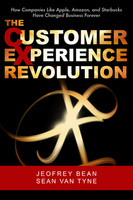So what is the Difference between Customer Experience and User Experience?
This is one of the most frequent questions that Jeof and I get. If you have read our book or heard us speak than you know the short answer. For the record, I want to share the longer (and more academic) answer. Don Norman is most credited for coining the term User Experience while at … Read more



